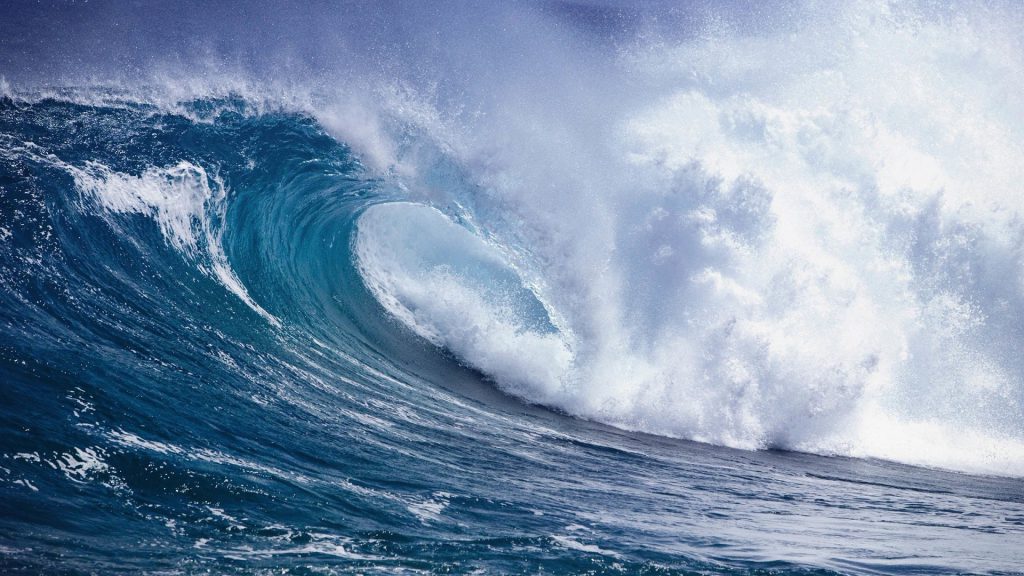Dreams have long fascinated humanity, serving as windows into our subconscious minds and offering glimpses of our deepest fears, desires, and emotions. Among the myriad of dream scenarios, those involving tsunamis stand out as particularly powerful and evocative. These massive waves, capable of reshaping coastlines and altering lives in the waking world, carry equally profound symbolism in the realm of dreams. This article delves deep into the symbolism and psychological interpretations of tsunami dreams, exploring their potential meanings across various cultural contexts and psychological perspectives.
The Symbolic Nature of Tsunami Dreams
Tsunamis in dreams often represent overwhelming emotions, significant life changes, or impending challenges. The sheer scale and power of a tsunami in a dream can symbolize feelings of being overwhelmed or out of control in one’s waking life. Dr. Carl Jung, the renowned psychologist, believed that water in dreams often represents the unconscious mind, with large bodies of water symbolizing the collective unconscious. In this context, a tsunami might represent a surge of repressed emotions or unconscious content breaking through to the conscious mind.
The color of the tsunami waters in a dream can also carry symbolic meaning. Clear, blue waters might represent clarity and insight, while murky or dark waters could symbolize confusion or hidden fears. The speed and size of the wave can indicate the perceived urgency or magnitude of the dreamer’s concerns.
Cultural Interpretations of Tsunami Dreams
Different cultures have varied interpretations of tsunami dreams, often influenced by their relationship with the sea and natural disasters:
- In Japanese culture, where tsunamis are a real-life concern, dreams of tsunamis might be seen as warnings or premonitions.
- Some Native American tribes associate water dreams with emotional healing and spiritual cleansing.
- In Hindu tradition, dreams of large waves might be interpreted as a sign of spiritual awakening or the washing away of past karma.
Psychological Perspectives on Tsunami Dreams
From a psychological standpoint, tsunami dreams often reflect the dreamer’s emotional state and life circumstances. Dr. Rosalind Cartwright, a sleep researcher, suggests that dreams help process emotions and experiences from our waking lives. In this context, a tsunami dream might indicate:
- Feeling overwhelmed by responsibilities or emotions
- Fear of losing control in a particular situation
- Anxiety about impending changes or challenges
- A need to process and release pent-up emotions
Freudian psychoanalysis might interpret tsunami dreams as representations of repressed sexual desires or unresolved conflicts from childhood. Meanwhile, Gestalt therapy would encourage the dreamer to explore their feelings about each element of the dream, including the tsunami itself, to gain insights into their waking life.
Spiritual Meaning of Tsunami Dreams
From a spiritual perspective, tsunami dreams can be seen as powerful messages from the subconscious or even the divine. Many spiritual traditions view water as a symbol of purification and renewal. In this context, a tsunami dream might represent a spiritual cleansing or the washing away of old beliefs and patterns to make way for new growth.
Some spiritual interpretations see tsunami dreams as a call to embrace change and transformation. The destructive force of the tsunami might symbolize the necessary dismantling of old structures in one’s life to allow for spiritual evolution and enlightenment.
Biblical Meaning of Tsunami Dreams
In biblical contexts, dreams of floods or great waters often carry significant meaning. The story of Noah’s Ark, where a great flood cleanses the earth, is a prime example. While tsunamis aren’t specifically mentioned in the Bible, dreams of overwhelming waters could be interpreted similarly.
Some biblical scholars might interpret tsunami dreams as a call to faith and trust in divine protection amidst life’s storms. Alternatively, they could be seen as warnings to change one’s ways or prepare for significant life changes, much like the prophetic dreams found throughout the Bible.
Common Dream Scenarios Involving Tsunamis
- Seeing a tsunami approaching: This might represent an awareness of impending challenges or changes in one’s life.
- Being swept away by a tsunami: Could symbolize feeling overwhelmed or losing control in a situation.
- Surviving a tsunami: Might indicate resilience and the ability to overcome significant challenges.
- Warning others about a tsunami: Could represent a desire to help others or a feeling of responsibility.
- Riding a tsunami: Might symbolize attempting to harness or control powerful emotions or situations.
- A tsunami destroying one’s home: Could represent fears about stability or security in one’s life.
- Multiple tsunamis: Might indicate recurring or compounding challenges or emotions.
Expert Opinions and Studies on Tsunami Dreams
Dr. Kelly Bulkeley, a dream researcher and visiting scholar at the Graduate Theological Union, suggests that natural disaster dreams, including tsunamis, often reflect societal anxieties about climate change and environmental destruction. In a study published in the journal Dreaming, Bulkeley found that dreams of floods and tidal waves increased in frequency following major natural disasters, indicating a collective processing of these events through dreams.
Dr. Deirdre Barrett, a psychologist at Harvard Medical School, notes that tsunami dreams became more prevalent following the 2004 Indian Ocean tsunami, even among people not directly affected by the event. This suggests that major world events can influence our dream content on a broader scale.
Interpreting Tsunami Dreams in the Context of Personal Life
When interpreting tsunami dreams, it’s crucial to consider the dreamer’s personal circumstances and emotions. Here are some potential interpretations based on different life aspects:
- Love and Relationships: A tsunami in a dream might represent overwhelming emotions in a relationship, fears of losing a partner, or the need to “clear the slate” in one’s love life.
- Career: Tsunami dreams could symbolize feeling overwhelmed at work, fear of failure, or anticipation of major changes in one’s career path.
- Personal Growth: These dreams might indicate a readiness for significant personal transformation or the need to confront and process powerful emotions.
- Abundance: While tsunamis are often destructive, they can also represent an overwhelming influx of resources or opportunities, albeit in a potentially challenging form.
Practical Advice for Frequent Tsunami Dreamers
If you frequently dream about tsunamis, consider the following steps to help decode and learn from these dreams:
- Keep a dream journal: Record your tsunami dreams in detail, noting the emotions you felt during and after the dream.
- Identify recurring themes: Look for patterns in your tsunami dreams and how they might relate to your waking life.
- Reflect on your current life situation: Consider any overwhelming situations or emotions in your life that the tsunami might represent.
- Practice mindfulness and stress-reduction techniques: This can help manage anxiety that might be manifesting in tsunami dreams.
- Seek professional help if needed: If tsunami dreams are causing significant distress, consider speaking with a therapist or dream analyst.
- Use the dream as inspiration: Consider how you can harness the power and transformative nature of the tsunami in your waking life for positive change.
In conclusion, tsunami dreams, while often unsettling, can provide valuable insights into our emotional state and life circumstances. By paying attention to these dreams and reflecting on their potential meanings, we can gain a deeper understanding of ourselves and navigate life’s challenges with greater awareness and resilience. Remember, the interpretation of dreams is highly personal, and the most meaningful insights often come from within.

Was the tsunami dream meaning helpful to you? Please share this dream with your friends.
